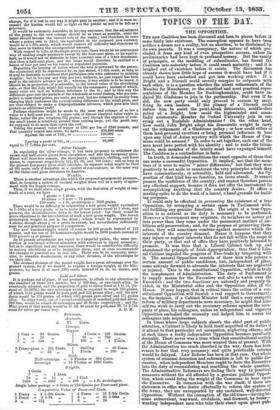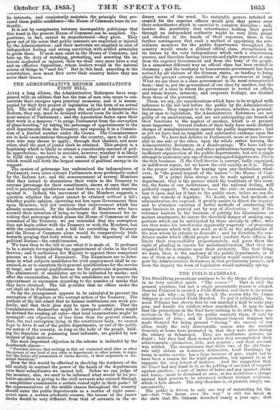TOPICS 'OF THE DAY.
THE OPPOSITION.
TER new Coalition has been discussed and torn to pieces before it came fairly into existenee. The conception appears to have been neither a dream nor a reality, but an abortion, to be disclaimed by its own parents. It was a conspiracy, the nature of which pre- cluded it from any kind of even prospective success, unless its preliminaries had been kept in profound secrecy. But the vanity of principals, or the meddling of subordinates, has forced the
into to notoriety before it could reach maturity ; and it is laughed out of existence before it exists. The discussion .has already shown how little hope of success it-would have had if it could have been embodied and got into working order. If a Bright and a Disraeli could secretly conspire to cooperate with each other, it is a question whether the nicest refinements of the Member for Manchester, or the sturdiest and most practical repre- sentations of the Member for Buckinghamshire, could have in- duced Mr. Gladstone to join in the partnership. But even if he did, the new party could only proceed to success by sacri- ficing its own leaders. If the pliancy of a Disraeli could induce him to assist the point-blank democratic, middle-class policy of a Bright, how could the highminded and essen- tially aristocratic Member for Oxford University join in car- -Tying out a Rochdale Administration P On the other hand, how could John Bright adapt his democratic weight to carry out the refinement of a Gladstone policy ; or how could either of them lend personal exertions or bring personal influence to bear upon any kind of Asian mystery with which the House of Com- mons could be amused ? In order to act together, each one of the men must have parted with his identity ; and to make the trium- virate, each member of the trinity must have expunged himself. The Coalition is a contradiction in facts.
In truth, it demanded conditions the exact opposite of those that -oan make a successful Opposition. It implied, not that the mem-
bers of it were to waive " minor differences," but that they were positively to set aside or counteract the very principles which they have conscientiously, or ostensibly, held and advocated. An Op- position of that kind has no function, no locus standi. It cannot possess the confidence of the country, and cannot therefore possess any effectual support, because it:does not offer the instrument for accomplishing anything that the country .desires. It offers a marling-spike to do the •work of alma, ahand-grenade for build- ing purposes.
It could only be effectual in preventing the existence of a true Opposition, by oeeupying a certain space in Parliament .with- out .fulfilling any genuine functions. The origin of a true Oppo- sition is as natural as its duty is necessary to be performed. However a Government may originate, its members no sooner get into power than they come under the paramount instinct of am- bitious self-preservation ; and, for the purpose of preserving them- selves, they will sometimes combine against measures which the interests of the country demand. Hence it happens that they may injure or neglect interests that do not fall within the scope of their party, or that out of office they have positively laboured to promote. It was thus that a Liberal Cabinet took up and abandoned the principle of Irish Appropriation ; thus that a Libe- ral Cabinet impeded the progress of h'ree-trade by tampering with it. The natural Opposition consists of those men who possess a certain amount of public confidence, but, independent of place, come actively forward to advocate the interests that are neglected or injured. This is the constitutional Opposition, which is truly the complement of Administration. The duty of Parliament is to supply means for the Executive and also to watch over the Executive ; and the two functions are naturally and properly di- vided, in the Ministerial sides and Ahe Opposition sides of the House. It may happen that in critical times the action of a con- stitutional Opposition will furnish a real support to Government; as, for instance, if a 'Cabinet Minister- held that a very energetic reform of military departments were necessary, he might find him- self too weak to carry out the necessary. reforms against the occu- pants of place, his colleagues, unless an independent and vigorous Opposition embodied the necessity and helped him to coerce his colleagues into acquiescence. In times where large subjects absorb the chief part of public attention, a Cabinet is likely to hold itself acquitted of its duties if it attend that particular set occupation, neglecting others; and at such times a really independent Opposition becomes peculiarly desirable. There never was a time when that constitutional section of the House of Commons was more wanted than at present. With the Administration too much absorbed in the war, there has been reason to fear that very necessary and quite practicable reforms would be delayed. Law Reform has been in that case. Our whole system of criminal detention and reformation is left to public dis- cussion, when independent Members ought to force the Executive into the duty of reconsidering and resettling the whole question. The Administrative Reformers are feeling /heir 'way to practical measures without the aid afforded by a genuine political Opposi- tion, which could bring the weight of the Commons to bear upon the Executive. In connexion with the war itself, if there are statesmen in office who desire effectually to reform the system of the Army, they are unsupported by any sustained, well-directed Opposition. Without the corruption of the old times—having be- come subservient, wayward, credulous, and froward, by turns— wanting independent men who take their stand upon great pub-
lie interests, and consistently maintain the principle that pro- cured them public confidence—the House of Commons loses its au- thority.
It 1.8 not by conspiracies between incompatible politicians that this want in the present House of Commons can be supplied. Op- positions, in fact, cannot be manufactured—they grow. They grow out of the sense that public interests are neglected or injured by the Administration; and their materials are supplied in men of independent feeling and -strong conviction with settled principles to guide them. If such men exist in the House of Commons, and take up the duty of watching, protecting, and asserting the in- terests neglected or injured, then we shall once more have a real and an effective Opposition, •whose leaders would in the natural course.of things be "sent for." But in this land, according to the constitution, men must first serve their country before they can serve their Queen.



























 Previous page
Previous page